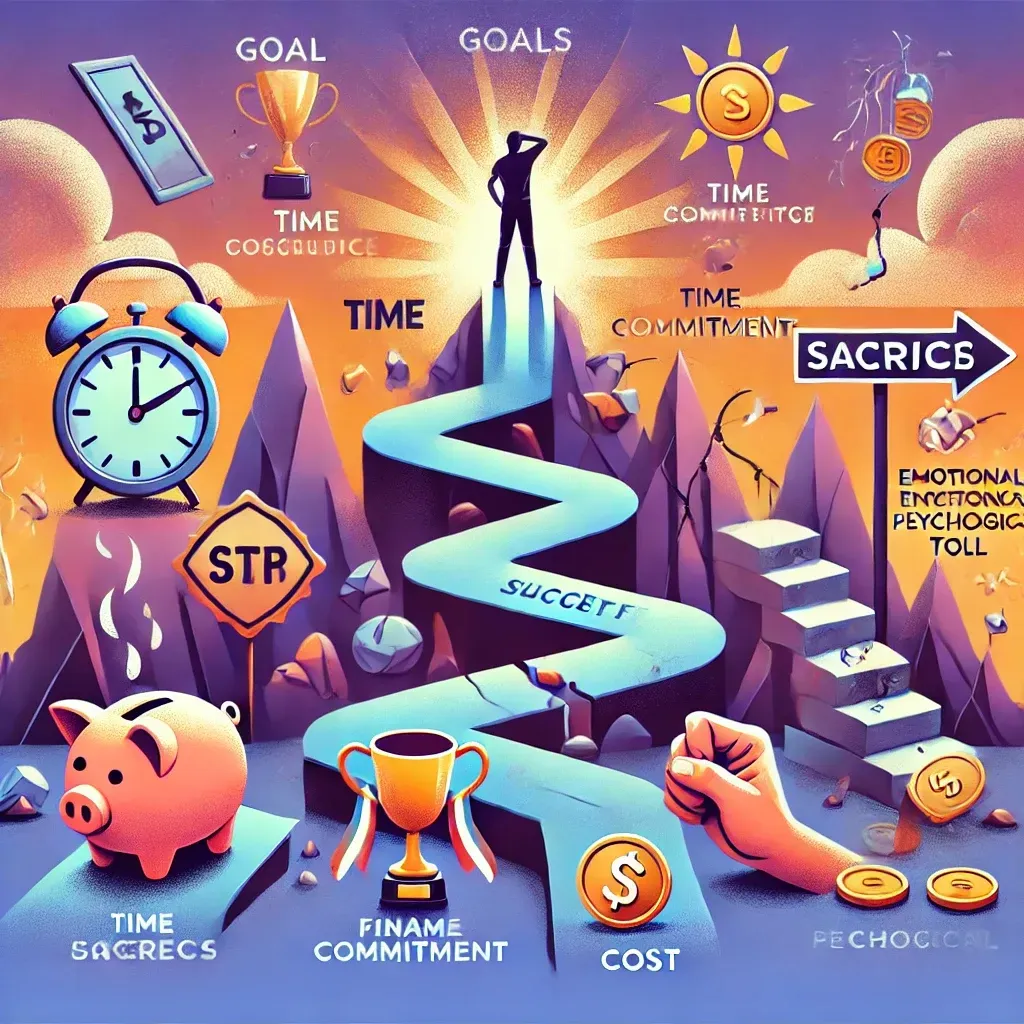Welcome To The Growth Gazette Blog!
This blog is designed especially for young adults seeking to transform past adversities into opportunities for self-improvement, clarity, growth, and personal transformation.
If you are feeling directionless, unseen, hopeless, lost, confused, isolated, alone, or unfulfilled, you've come to the right place.
Through the lens of my personal experiences—traveling to 14 countries, pursuing a career in acting, growing up with a single mother and drug addicted and alcoholic father, and overcoming the loss of a close friend—I understand the importance of facing fears and seeking personal growth. With the guidance of a life coach, I found my way to a more fulfilling, purpose-driven life.
I grew up with ADD and was labeled to have a learning disability. Always struggling with school and barely passing any of my classes. I got arrested multiple times when I was a teenager and got expelled from my school district.
But, I overcame all that. One day while in a drunk tank after being arrested for the 6th time at the age of 16, I said enough is enough.
I began to change the story that I was telling myself, diving deep into non-fiction books, taking courses, getting coached, and changing my belief system and mindset.
Now, I am here to help you do the same. At The Growth Gazette, you'll find:
Life Coaching Insights: Practical tips and strategies to empower you to take control of your life.
Overcoming Challenges: Proven methods to help you face and conquer your fears and obstacles.
Personal Growth Techniques: Tools to cultivate a growth mindset and overcome limiting beliefs and negative thoughts.
Empowering Articles: Stories and advice to inspire and motivate you on your personal development journey.
Join our community and unlock your potential. Embrace the journey of self-discovery and transformation. Let's work together to set clear goals, find your true purpose, and create a positive impact in your life and the world.
Welcome aboard! Let’s grow together.

Revealing Success: First Recognizing Sacrifices is Best for Achieving Goals
When setting goals, it’s easy to get swept up in the excitement of what achieving those goals will bring—whether it’s the promise of a healthier lifestyle, career advancement, or personal growth. The benefits are alluring, drawing us in with visions of success and fulfillment. However, there’s a critical aspect of goal setting that is often overlooked: the costs involved in reaching those goals.
While many people focus on the potential rewards, they fail to consider what they will have to give up or endure to get there. This oversight can lead to frustration, burnout, and ultimately, abandoned goals. In this post, we’ll explore the importance of recognizing both the costs and benefits of goal setting, and how a balanced understanding of both can significantly impact your ability to persevere and achieve your desired outcomes.
The Allure of Benefits: Why We’re Drawn to the Positive
When we set a goal, the benefits are usually what motivate us to start. The benefits of goal setting are numerous:
Clarity and Focus: Setting a goal gives you a clear target to aim for, helping you focus your energy and resources on what truly matters.
Motivation and Drive: The thought of achieving a goal can be incredibly motivating, pushing you to take action and stay committed.
Personal Growth: Working toward a goal often requires developing new skills, building resilience, and stepping outside your comfort zone, all of which contribute to personal growth.
Sense of Accomplishment: Achieving a goal brings a sense of pride and accomplishment, reinforcing your belief in your capabilities and encouraging further efforts.
These benefits are compelling, and they form the basis of why we set goals in the first place. However, focusing solely on these positive outcomes without considering the costs can set us up for failure.
The Hidden Costs of Goal Setting: What We Don’t Always Consider
Every goal comes with its own set of costs—time, effort, money, and even emotional energy. Yet, people rarely acknowledge these costs upfront. Here are some common costs that are often overlooked:
1. Time Commitment: Achieving meaningful goals takes time. Whether it's hours spent in the gym, late nights working on a project, or weekends dedicated to learning a new skill, time is a significant cost. Many people underestimate just how much time they’ll need to invest, leading to frustration when results don’t come quickly.
2. Sacrificing Comfort and Convenience: Progress often requires stepping out of your comfort zone and doing things that are difficult or inconvenient. This might mean waking up early to exercise, saying no to social outings to study, or moving to a new city for a job opportunity.
3. Financial Costs: Some goals require a financial investment—be it for education, starting a business, or purchasing equipment. These costs can be substantial and often require sacrificing other financial priorities or luxuries.
4. Emotional and Psychological Costs: Pursuing a goal can be emotionally taxing. The process may involve dealing with failure, facing fears, overcoming self-doubt, and managing stress. Emotional resilience is often tested, and the psychological toll can be significant.
5. Impact on Relationships: Time and energy spent on a goal may mean less time with family and friends. There might be conflicts or misunderstandings, especially if loved ones don’t fully understand or support your goal.
The Dangers of Overlooking Costs
Ignoring the costs associated with achieving a goal can be detrimental in several ways:
Unrealistic Expectations: If you only focus on the benefits, you may set unrealistic expectations about how easy or quick it will be to achieve your goal. This can lead to disappointment and discouragement when things don’t go as planned.
Lack of Preparedness: Failing to consider the costs means you’re not adequately prepared for the challenges you’ll face. When difficulties arise, you might feel overwhelmed and tempted to give up.
Decreased Motivation and Commitment: When the reality of the costs sets in—whether it’s the time commitment, financial strain, or emotional toll—your initial motivation can quickly wane. Without a clear understanding and acceptance of these costs, staying committed to your goal becomes increasingly difficult.
Inability to Persevere: Goals require perseverance, especially when faced with setbacks and obstacles. If you haven’t acknowledged the costs upfront, you’re less likely to push through these challenging moments.
How to Evaluate Costs and Benefits Effectively
To set yourself up for success, it’s crucial to evaluate both the costs and benefits of your goals. Here’s how you can do that effectively:
1. Be Honest About What It Will Take: Before setting a goal, take time to reflect on what achieving it will truly require. Consider the time, effort, money, and emotional energy involved. Be realistic about the sacrifices you’ll need to make.
2. Ask Yourself Tough Questions: Are you willing to wake up early every day to train? Are you prepared to invest financially in your education or business? Can you handle the emotional ups and downs of pursuing your goal? Asking these questions upfront will help you determine if you’re truly committed.
3. Create a Cost-Benefit Analysis: Make a list of all the potential costs and benefits of achieving your goal. Weigh these against each other. Are the benefits worth the costs to you personally? This analysis can help you make a more informed decision about whether to pursue a goal.
4. Plan for the Costs: Once you’ve acknowledged the costs, create a plan for how you’ll manage them. This might involve budgeting your time or money, finding a support system to help you stay emotionally balanced, or setting aside time for self-care to avoid burnout.
5. Accept the Sacrifices: Accepting the sacrifices upfront helps you prepare mentally and emotionally for what lies ahead. When you know what to expect, you’re less likely to be caught off guard and more likely to persevere.
Embracing the Costs: A Path to True Commitment
Accepting the costs of achieving your goals doesn’t mean you have to like them, but it does mean recognizing them as a necessary part of the journey. When you’re fully aware of what’s required, you’re more likely to stay committed, even when the going gets tough. It’s easy to dream about the benefits, but it’s the willingness to endure the costs that truly determines your success.
Following these steps and the advice from this article can not only help you be prepared for the costs from pursuing your goals, but also allow you to prepare others for what you are going to be committing to. Sometimes other people can't or won't understanding what you are doing and why, but as long as you communicate with them about it, you've done your part.
Conclusion
Goal setting is not just about dreaming big; it’s about understanding what it takes to turn those dreams into reality. While the benefits can be enticing, the costs are equally important to consider. By acknowledging both, you prepare yourself for the full journey ahead, ensuring you’re ready to persevere through challenges and make the necessary sacrifices to achieve your goals.
Remember, every goal has a price. Are you willing to pay it? Being honest about this question from the start will help you choose the right goals and stay committed to achieving them. Your success depends not just on your desire for the benefits, but also on your willingness to embrace the costs.
What goals have you set for yourself recently? What are the costs that you have discovered you'll have to pay because of this blog post?
If you enjoyed this blog post, please let others know about it or share it with people who could really benefit from it! And check out our resource page to snag free workbooks with exercises to help you achieve your ultimate potential!
Additional Resources: Click The Links To Check Them Out!
Blog Post: Setting Goals That Stick
Before You Go, Check Out My Newsletter!
Stay Up To Date With Actionable Tips & Advice!

